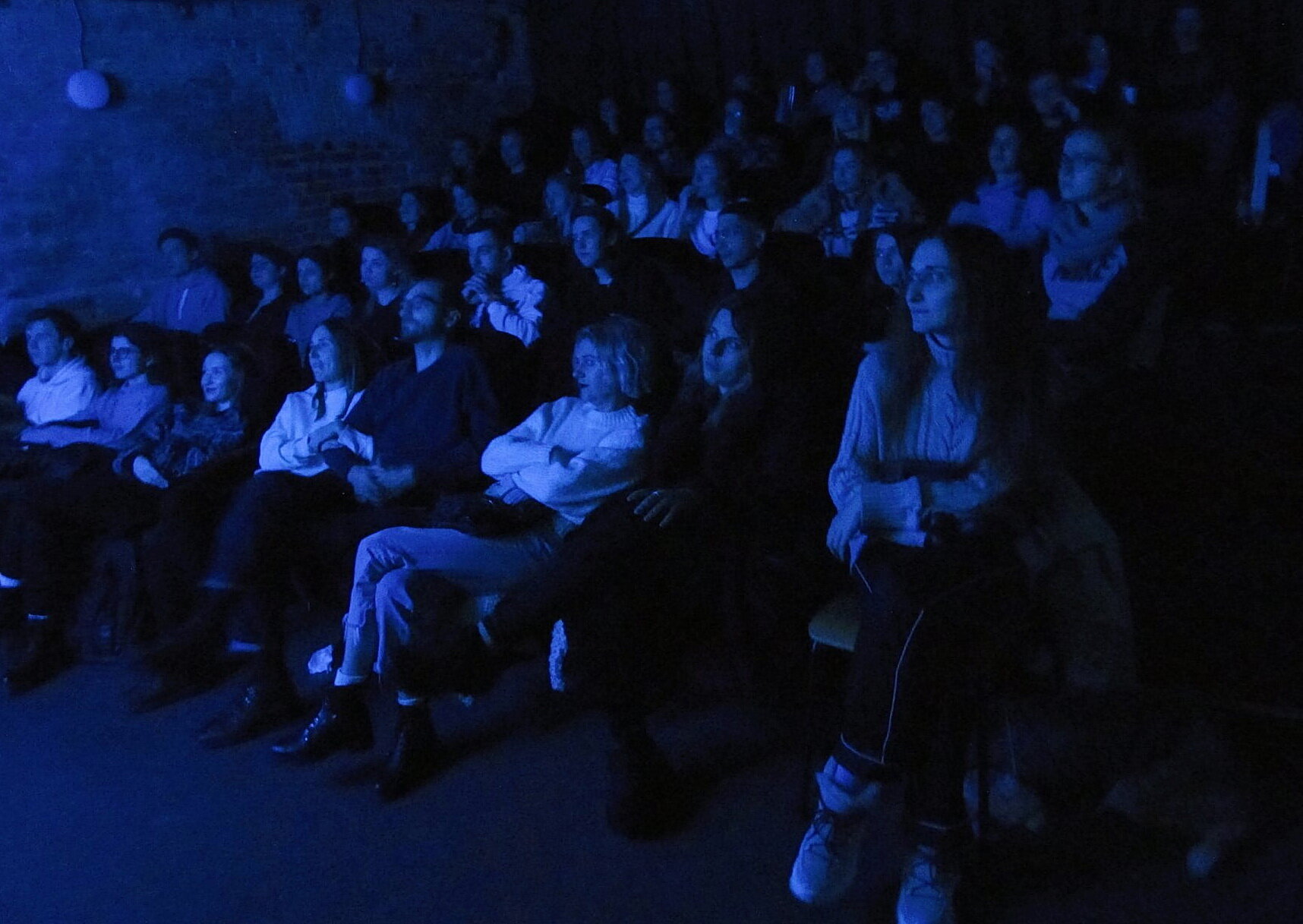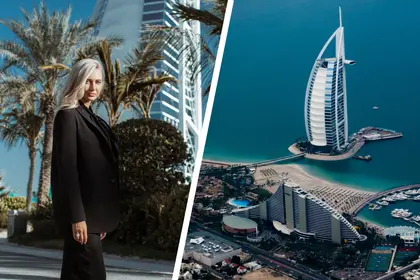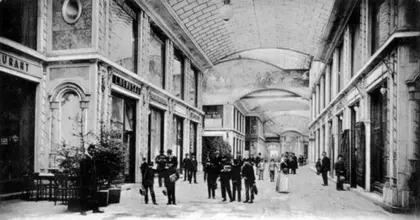Cinema Kino42 had been under the coronavirus lockdown longer than it had been in business.
It opened in December 2019 in Kyiv, but in those first three months before the COVID‑19 outbreak, it turned into a meeting place for the film community and a favorite among expats for its screenings in original languages and with English subtitles.
Founded by film distributor Illia Gladshtein and hotel manager Vasily Grogol, Kino42 provided a distraction-free cinema experience with a curated film selection inside the Bursa boutique hotel in Kyiv’s central Podil district.
And now it’s back after the easing of COVID‑19 lockdown, which was in place for Kyiv’s cinemas from March 12 to July 3. And though it had to cut the number of seats in half, this small independent movie theater may be best adapted to withstand the uncertain pandemic economy.
Cinemas lost
Most cinemas showing independent and non-mainstream films had closed in Kyiv even before the pandemic.
Ukraina and Kinopanorama, two historical cinemas that often screened art-house and niche movies, closed one after another in October 2018. The owners of both theaters had other plans for the buildings they privatized from the city in the 2000s.
Fast-forward to June 2019, and the municipal cinema that often hosted film festivals, Kyiv, closed too. The city rented the building to another company — the Cinema City network that mostly shows mainstream films. The Kyiv cinema is now under renovation.
By mid‑2019, the only movie theater that regularly screened international independent films in Ukraine’s capital, a metropolis with over 3 million residents, was the Zhovten multi-screen complex. There is also Kyiv’s municipal Lira cinema, but its specialty is only Ukrainian-made movies.
Then Kino42 arrived.
New opportunities
The closing of three non-mainstream movie theaters was a blow for Gladshtein. Besides being a film lover, Gladshtein owns 86 Prokat, an independent film distribution business that worked with two of the cinemas that had shut down. Zhovten remained his only regular client.
Gladshtein’s other project had also come to a close in 2018. It was the fifth and last year that his 86 documentary film festival took place in Slavutych, which attracted hundreds of film lovers to drive some 190 kilometers north of Kyiv each May.
“The festival was cool, but it took a lot of resources and existed only for five days a year,” Gladshtein told the Kyiv Post. “So the idea was to transform the event into a place, which would be more sustainable.”
That idea came in handy when Gladshtein enrolled in the Lviv Business School, which helped him develop a business plan for a cinema. And when he lost many clients of his distribution business, the timing was perfect for a new independent cinema in Kyiv.
“It was a strong motivation to open our own movie theater. I also realized that we would have the demand from the audience that lost the places where it used to gather in Kyiv. We had to do it then,” Gladshtein says.
The only thing missing was the place. Looking for one, Gladshtein says he developed a habit of counting the number of seats that would fit into almost every room he entered. In December 2018, he found a place that would fit 42 seats in an art gallery inside the Bursa hotel.
The place
Grogol, executive director of the Bursa boutique hotel, says he always dreamt of creating a cinema.
He got the bug in New York City, where he liked going to the legendary Film Forum and Sunshine independent cinemas, as well as the more commercial AMC theater chain. Later, in Prague, he was a regular at Bio Oko, Aero and Svetozar — a chain of indie cinemas, each with its distinct look.
“I love the atmosphere of movie theaters: the soft chairs, good sound and screen projection, even popcorn (unlike Gladshtein). And the whole experience of watching good films,” Grogol told the Kyiv Post.
So when Gladshtein suggested turning Bursa’s art gallery into an independent cinema in spring 2019, he found himself a business partner in Grogol. By the end of the year, Kino42 opened in the basement of the Bursa hotel with vintage red chairs bought from the closed Ukraina movie theater.
“It’s a way to develop the Bursa brand too,” Grogol says. “There are now several businesses under one roof in Bursa: music bar Parakalo, cafe White Noise, rooftop bar 1818 and Kino42 — all living together.”
Kino42’s name comes from the number of seats there and is a number like 86, Gladshtein’s festival and distribution company. It’s also a reference to Douglas Adams’ “The Hitchhiker’s Guide to the Galaxy” comedy science fiction series, where “42” was a supercomputer’s answer to “the Ultimate Question of Life, the Universe, and Everything.”
Concept
Prague’s Bio Oko, Aero and Svetozar cinemas became the most important references for Gladshtein and Grogol. Besides careful programming by Gladshtein, Kino42 emphasizes purity of the cinematic experience: There’s no phone connection and the lights turn on only after the credits. There’s also no popcorn, although the owners are considering selling some other snacks.
Most importantly, films in Kino42 are screened only in their original languages with subtitles — either Ukrainian or English. The first film screened in the cinema was a rough cut of a movie by Marc Wilkins, a Swiss director living in Kyiv.
There are also special screenings followed by Q&As with film directors, actors, crew and critics. Events like this turn Kino42 into a meeting place for the audience and film community.
“There is a film community family vibe at Kino42, but it’s not exclusive, it’s open for everybody,” Wilkins, a regular visitor, told the Kyiv Post. “And I’m very much dependent on Kino42 to watch movies in original versions with English subtitles.”
COVID‑19 realities
A few days before the Ukrainian government imposed the nationwide COVID‑19 quarantine on March 12, Gladshtein told the Kyiv Post that ticket sales were already in decline because people were cautious. He said that closing cinemas back then was justified.
But none of the cinemas were ready for a lockdown that would last for over three months.
“It was quite hard to experience this uncertainty. We did not know when it would end, and we still don’t know whether there will be another lockdown,” Gladshtein says.
Still, Kino42 fared much better than larger cinemas: it has minimal staff and shares utility costs with the Bursa hotel. Most importantly, the cinema did not have to pay rent to the hotel during the lockdown, which is much below the market rate anyway.
Other cinemas also tried to renegotiate rent with shopping malls or other landlords. Some sold certificates for future tickets to stay afloat. Kino42 did not do so, but only sold a batch of T-shirts saying “Kino42. Don’t panic” — another reference to “The Hitchhiker’s Guide to the Galaxy.”
Cinemas in most Ukrainian cities were allowed to reopen on July 3 under some safety rules. Like all these cinemas, Kino42 cut the number of seats in half, with people sitting chequerwise — every other seat and row. People should still wear face masks inside, and the cinema is disinfected and ventilated more often.
But there is one major setback: most distributors are postponing their releases because cinemas are still in lockdown in big-market countries like the U. S. The release of “Tenet,” the most anticipated summer blockbuster by director Christopher Nolan, has been postponed four times. This is most problematic for cinemas that depend on blockbusters for their ticket sales.
Independent cinemas have a similar problem with distributors of niche films, but on a much smaller scale, Gladshtein says. They are much better adapted to provide curatorial programming for their film-loving audience. Kino42 reopened with a selection of films and Q&As by young Ukrainian directors, and ticket sales were very good, Gladshtein says.
“I believe that small niche cinemas that have curatorial power and work with their audience will survive better than multiplexes that are dependent on blockbuster releases and product sales.”
Watch “All the Sleepless Nights” (documentary, July 31 — Aug. 2), “The Tribe” (drama, Aug. 1) and “Beats” (documentary, Aug. 6–12) in English or with English subtitles at Kino42 (11 Kostiantynivska St.) Buy tickets here.
You can also highlight the text and press Ctrl + Enter








Comments (0)